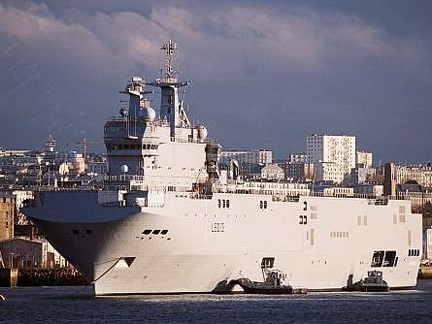
NATO Disinclined to Debate Mistral Affair
Publication: Eurasia Daily Monitor Volume: 7 Issue: 220
By:

Debate on the implications of military sales to Russia is stifled in NATO. The proposed sale of French Mistral-class warships to Russia is by far the largest among possible Russian procurements under discussion. Non-member country Georgia has taken the lead in airing concerns over the Mistral affair. This tends to be misperceived as a Georgia related concern, instead of being recognized as an Alliance issue. It poses a political-institutional challenge to NATO, and will add a defense-planning challenge in the Black Sea and Baltic theaters, if the sale to Russia goes ahead.
Russia’s Black Sea Fleet is explicitly tasked to support Russian ground-force operations in that theater, as it did in August 2008. Procurement of the Mistral, a power-projection capability by definition, would significantly increase Russia’s offensive options and Georgia’s vulnerability to attack or blockade of its defenseless seaboard.
In a longer term perspective, as an aspirant to NATO membership, Georgia is keenly interested in the Alliance’s political cohesion. NATO’s eastward enlargement process showed that aspirant countries can be more strongly motivated than some “old” members about the Alliance’s cohesion and credibility. Georgia presently displays that motivation amid far more challenging circumstances for itself and NATO. Military sales to Russia from Western Europe, circumventing the Alliance, and disregarding the interests of allies and neighbors, would erode NATO if allowed to proceed.
Ruled out of the agenda well ahead of NATO’s November 19-20 summit, the Mistral issue resurfaced with a WikiLeaks batch disseminated two weeks later. The Georgian government had continued raising this issue with the United States and in other bilateral channels behind closed doors. In November 2009 the US Ambassador to Georgia, John Bass, reported that Georgian Foreign Minister, Grigol Vashadze, had repeatedly voiced concerns to the ambassador and to the visiting US Deputy Assistant Secretary of State, Tina Kaidanow, in Tbilisi. The Georgian government was asking the US to oppose the Mistral sale; and President, Mikheil Saakashvili, was going to raise this matter at the top levels in the US and Europe. The ambassador in turn recommended to Washington to take action, in Paris and at NATO, to discourage the warship sale. The US should “at the very least seek a firm commitment from Russia that the ships would not be deployed in the Black Sea.”
The Georgians (with the US ambassador apparently concurring) noted the incongruity of France starting to arm Russia after the latter had systematically broken the French-mediated 2008 armistice terms. This would imply either that mediator France was satisfied regardless, or that the armistice terms were no longer binding. The warship deal, if consummated, would show NATO indifference to Russian intentions, giving Russia a new capability to enforce or threaten to enforce its will in the Black Sea, without Western interference. The Georgians underscored the precedent-breaking nature of the proposed warship sale, which would “open the floodgates” for other West-European arms sales to Russia (cable from Ambassador Bass to the State Department, November 19, 2009, https://cablegate.wikileaks.org).
Tbilisi’s message would have carried greater weight if accompanied by similar messages in bilateral channels from NATO member countries in the Black Sea as well as the Baltic. Whether this was the case seems far from certain. While the message from Tbilisi was about discouraging the sale, the trend in NATO was to discourage debate. That same month, November 2009, Russian Prime Minister, Vladimir Putin, declared in Paris that Russia alone would determine where to deploy the four Mistral-class warships after their possible procurement.
Romania is known to share Georgia’s concern, but seemingly reluctant to voice it. Romanian President, Traian Basescu, waited a full year until asking openly, after NATO’s summit had itself failed to ask the question: “Why does Russia need a big naval fleet in this small [Black] Sea?” (Interview with Romania Libera, December 1).
In February 2010, Baltic representatives at NATO headquarters in Brussels made a rare attempt at introducing the Mistral issue into discussions among Allies. The permanent representatives of Lithuania and Estonia, Linas Linkevicius and Juri Luik, cautiously suggested debating this matter during an informal, then a formal (North Atlantic Council) meeting of member countries at the ambassadorial level. However, France and other West-European countries took the traditional position that arms sales are a bilateral matter, and not appropriate to discuss within NATO. The Alliance’s Secretary-General, Anders Fogh Rasmussen, supported that position and also went public with it adamantly.
Not unusually at NATO, Baltic representatives turned privately to the US delegation for a more adequate understanding of their concerns. Reporting to Washington, US Ambassador Ivo Daalder recommended that the US should support discussion of the Mistral issue in NATO, given the significance of the possible sale of warships to Russia, and in light of some allied countries’ concerns (cable from Ambassador Daalder to the State Department, February 12, 2010, https://cablegate.wikileaks.org).
The latest WikiLeaks also cast some light on tortuous efforts toward developing NATO contingency plans for the defense of Poland and the Baltic States. This process, which is yet to be completed, must steer between political objections from Russia and from within NATO itself. Immediately following the WikiLeaks disclosure, Russia’s envoy to NATO, Dmitry Rogozin, criticized the contingency planning activity as incompatible with a trust-based partnership between NATO and Russia, and threatened a Russian backlash (Interfax, December 7).
NATO’s 54-point Lisbon summit declaration and the Alliance’s new Strategic Concept, also adopted at the Lisbon summit on November 19-20, omits the issue of arms transfers. Military sales to Russia from Western countries on a bilateral basis, ignoring NATO and the implications for the common defense, loom as internal an challenge to the Alliance presently, and may (if consummated) turn into an external challenge on NATO’s eastern borders.




